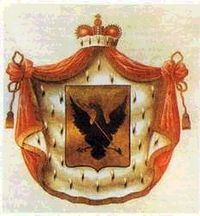Gorchakov

TheHouse of Gorchakov,orGortchakoff(Russian:Горчако́в), is a Russianprincelyfamily ofRurikidstock that is descended from the Rurikid sovereigns ofPeremyshl, Russia.
Aleksey Gorchakov[edit]
The family first achieved prominence during the reign ofCatherine II.PrinceAleksey Ivanovich(1769–1817) served with distinction under his uncleSuvorovin theTurkish Wars,and took part as a general officer in theItalian and Swiss operationsof 1799, and in the war against Napoleon inPolandin 1806–1807 (Battle of Heilsberg). He succeededBarclay de Tollyas theMinister of Warin 1813. His brotherAndrei Ivanovich Gorchakov(1776–1855) was a general in the Russian army who took a conspicuous part in the final campaigns againstNapoleon.[1]Their cousin PrincessPelageya Nikolayevna Gorchakova(1762–1838) was fictionalized by her grandsonLeo TolstoyinWar and Peace.[citation needed]
Pyotr Gorchakov[edit]
PrincePeter Dmitrievich Gorchakov(1790–1868) served underMikhail KamenskyandMikhail Kutuzovin the campaign against Turkey, and afterwards against France in 1813–1814. In 1820 he suppressed an insurrection in theCaucasus,for which service he was raised to the rank ofmajor-general.In 1828–1829 he fought under PrincePeter von Wittgensteinagainst the Turks, won an action at Aidos, and signed the treaty of peace atAdrianople.In 1839 he was made governor of EasternSiberia,and in 1851 retired into private life.[1]
When theCrimean Warbroke out he offered his services to the emperorNicholas,by whom he was appointed general of the VI army corps in theCrimea.He commanded the corps in the battles ofAlmaandInkerman.He retired in 1855 and died atMoscow,on March 18, 1868.[1]
Mikhail Gorchakov[edit]
PrinceMikhail Dmitrievich(1795–1861), brother of the last named, was appointed commander-in-chief of the Russian troops which occupiedMoldaviaandWallachiaafter the outbreak of theCrimean War.In 1854 he crossed theDanubeand besiegedSilistria,but was superseded in April by PrinceIvan Paskevich,who, however, resigned on June 8, when Gorchakov resumed the command.[1]
In 1855 Gorchakov was appointed commander-in-chief of the Russian forces in the Crimea in place of the disgracedPrince Menshikov.Gorchakov's defence ofSevastopol,and final retreat to the northern part of the town, which he continued to defend till peace was signed inParis,were conducted with lack of energy. In 1856 he was appointed governor-general of Poland in succession to Prince Paskevich. He died at Warsaw on May 30, 1861, and was buried, in accordance with his own wish, atSevastopol.[1]
Alexander Gorchakov[edit]
PrinceAlexander Mikhailovich Gorchakov(1798–1883) served asChancellor of the Russian Empire(in office from 1867) during the reign of EmperorAlexander II(r. 1855–1881). He was educated at theTsarskoye Selo Lyceum,where he had the poetAlexander Pushkinas a school-fellow.[1]In 1820–22 he accompaniedForeign MinisterKarl Nesselrodeto theHoly Alliancecongresses atTroppau,Laibach,andVienna.
Gorchakov was appointed Foreign Minister in April 1856 soon after the end of theCrimean Warof 1853 to 1856; he represented theRussian Empireat theParis Congress of 1856.His main objective was to restore Russia's international prestige after the bitter defeat. At first he steered the country towards an alliance withNapoleon IIIof France, but rebuffed by the latter's support of theJanuary Uprisingin Poland, joined his archrivalOtto von Bismarckin setting up theLeague of the Three Emperorsin 1873. Following France's defeat in theFranco-Prussian Warof 1870–1871, Gorchakov succeeded in his long-term goal or revising the key clauses of the Paris Treaty, especially those containing Russia's interests in theBlack Sea.
The aged chancellor was so disgusted by the modification of theTreaty of San Stefanoat theBerlin Congressof 1878 that in 1882 he laid down all his offices and settled into retirement. He died some months later.
In popular culture[edit]
The Gorchakov family play a central role in1636: The Kremlin Gamesand other works inthe Russian thread of the1632alternate history science fiction series.
References[edit]
This articleneeds additional citations forverification.(February 2016) |
- ^abcdefOne or more of the preceding sentences incorporates text from a publication now in thepublic domain:Chisholm, Hugh,ed. (1911). "Gorchakov".Encyclopædia Britannica.Vol. 12 (11th ed.). Cambridge University Press. p. 246.
External links[edit]
- (in Russian)Gorchakov genealogy
